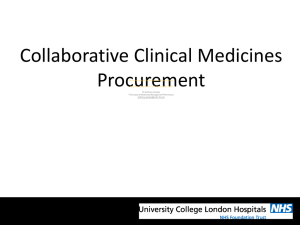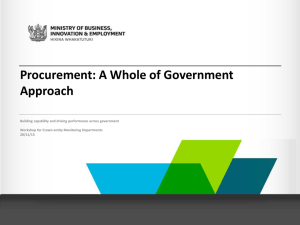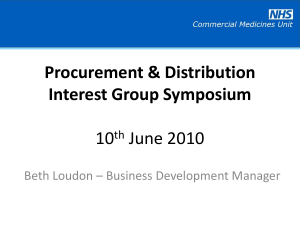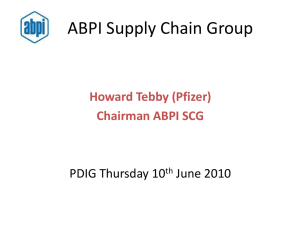PDIG Procurement Basics Course - Module 2
advertisement
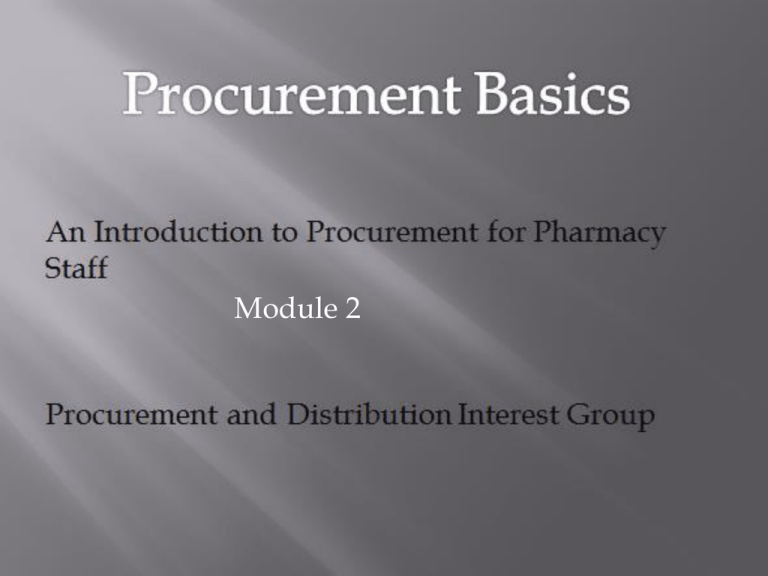
Module 2 Contents 1. How can I help the pharmacy ordering office to obtain a new medicine? 2. Why should I talk to my procurement staff when I don’t work there? 3. What training is available in pharmacy procurement ? 4. Industry can offer value added services. Are these ok to access and how should we deal with them ? 5. What is the best way to manage reps? 6. How do we go about sourcing a product out of hours when procurement staff are not here? Question 1 How can I help the pharmacy ordering office to obtain a new medicine? Answer Placing an order for a medicine is not a simple task of picking up the phone and ordering. There are a number of steps necessary before proceeding. 1. Source of Supply Many medicines are easy to source (details of suppliers are in BNF, MIMS etc.). However others are not, especially trial materials, unlicensed medicines etc. Always try to have a source available, or at least the name of another centre that is using the product so a source can be obtained. 2. Supplier Evaluation The NHS will always try to source products from suppliers that have been evaluated. There is a national mutual recognition process involving QA pharmacists that ensures suppliers are only evaluated once by the NHS. 3. Formulary Considerations Procurement staff are often the last line in formulary management systems. If a request is non formulary then a referral may need to be made to authorise the request. This will vary depending on in house systems. 4. Adding to Pharmacy System A new medicine will not necessarily be present on the pharmacy system, and will have to be added. This process may be restricted to senior staff and hence may take some time. 5. Ordering All medicines ordered in secondary care have to have a clear audit trail. That is the trust auditor has to be able to see a complete record of all transactions. (This is obviously to prevent fraud and theft). To accomplish this all orders have to be undertaken through the pharmacy system with an official order number. It may be that some suppliers require a minimum value before an order will be processed (this can be overcome in an emergency if a fee is paid). 6. Lead time Many medicines are available the same or next day from a wholesaler. However not all medicines are stocked by wholesalers and the time to obtain them (lead time) may be extended; especially if the medicine has to be imported from abroad. Procurement staff will normally be able to predict a typical lead time for a supplier. Questions 1. Describe three steps that are required to be undertaken before a medicine can be obtained safely. Question 9. Why should I talk to my procurement staff when I don’t work there ? It is essential that all sections of pharmacy department communicate effectively. The following table explains the types of communications necessary to ensure a seamless service to customers. Questions 1. Name two subjects of communication between formulary pharmacists and procurement staff 9. What training is available in pharmacy procurement Several forms of procurement training are available (indeed you are undertaking one now!) 1. Regional procurement training. Several regions provide procurement training for trust staff. Contact regional E&T or procurement specialist for details. 2. CMU Courses The courses run by CMU as part of their training for buyers have recently been made available for non CMU staff. These are free of charge to NHS staff. They are also useful and give a non pharmacy perspective that is valuable. Procurement Training (Cont). 3. CIPS Training CIPS (Chartered Institute for Procurement and Supply) has accredited courses from Certificates to PhD’s in procurement. Details are available on the CIPS website. You do not necessarily have to be a member to sit these. 4. NVQ’s There are a series of NVQ’s in ordering and supply. Details are available on the web. Questions 1. List the training options available in pharmacy procurement? Additional resources CMU training from CMU website http://cmu.dh.gov.uk/ London Education and Training information www.londonpharmacy.nhs.uk CIPS training available from CIPS website www.cips.org Question 10 Industry can offer value added services. Are these ok to access and how should we deal with them ? Answer Pharmaceutical industry commonly offers all sorts of support to the NHS. This is governed by the ABPI code of practice and should be directed at the NHS service not individuals. Any individual benefit needs to be carefully assessed against professional and trust policy (all trusts will have a bribery policy). If benefits are taken up they need to be declared on a trust declaration of interest form. This is in your best interest. “Value added” services include any offers made to trusts as part of a tender that are not related to the price of the medicine. They may include training support, extra equipment or even payment for staff to help implement a work programme relating to the use of the product (e.g. a trials nurse). The use of “value added” elements allows trusts access to suppliers marketing budgets and hence the offer may be more economically beneficial than simply asking for price reductions on the product. However it is important that “value added” services are considered and included in a formalised and equitable way. Ideally the types of services which are to be included in a tender should be identified beforehand and included in the product specification. A rule of thumb is that only those items which a trust would pay for in any event should be included as 2value added”. Just because something is “nice” does not mean it should be included in the tender. Once the list of services to be included has been agreed, these should be costed at the price to the trust (i.e. what it would cost to provide these if the trust were paying for them and not the cost to the providing supplier). A bid can then be relatively easily assessed as to which provides the most benefits to the trust. The DoH, RPSGB and CIPS all provide guidance on working ethically with the pharmaceutical industry. Questions 1. Do you know how to find you trust bribery policy? If not then find a copy. 2. Why is it important to consider costs at trust prices and not the suppliers? 3. Why not just ask for prices off the cost of the drugs. How does this relate to PPRS? 4. Why is it important that all “value added” services are registered at trust level? Additional resources ABPI code of Practice www.abpi.org.uk CIPS guidelines available from CIPS website www.cips.org RPSGB guidelines available fro RPSGB website www.rpsgb.org.uk DoH guidelines “Commercial Sponsorship- Ethical Standards for the NHS” on DOH website www.doh.gov.uk Question 11 What is the best way to manage reps? Answer Pharmaceutical representatives are paid by manufacturers to sell their products. They can be a useful source of information and resources for buyers, but can also waste a lot of time. Remember that some companies still measure reps results by call rates that is they are paid by the number of times they see you whether or not the call is useful to you. Most experienced buyers will only see reps by appointment at designated times. This could be two mornings a week for example. Some find out the subject of the call beforehand and only grant an appointment if the meeting will be of benefit. For example a rule of thumb could be:- “New rep, New Drug, New Deal” That is the buyer will see a new rep to explain the local policies about visiting, how the D&T works etc. (Some insist that this visit is documented, that written instructions are given to reps who sign to show they accept the local rules). The buyer will see a rep to discuss a new drug and how this is to be dealt with by D&T etc. And the buyer will see a rep to discuss any new purchasing arrangements either initiated by the trust or by the company. The ABPI have a code of practice to which members must adhere. This outlines the way in which products can be marketed and behaviour of reps. A breach of this code is a serious offence and one that companies have to take seriously. If you have a complaint about a rep then the first port of call would be their area manager. If this is unsuccessful and/or the complaint breaches the ABPI code, then a formal complaint can be made to the ABPI. Questions 1. Why is it important to see reps by appointment only? 2. What sanctions can a buyer take to deal with unacceptable behavior from a rep? Additional resources ABPI Code of Practice or www.abpi.org.uk Question 12 How do we go about sourcing a product out of hours when procurement staff are not here? Answer Sourcing a new medicine is a crucial pharmaceutical skill. It is important that this process is done efficiently and speedily and in a way that is commensurate with patient need. It is easy to overreact to clinical demands, although it is essential that real patient needs are met. Consider the following questions. NB these are not in any particular order. The order they should be considered will depend on individual circumstances. For example it may be best to go straight to a therapeutic alternative for a stimulant laxative if a product is temporarily unavailable. However the exact form and dose of an iv antibiotic may be essential in a septic crisis. Short Term Measures It is obviously important that the short term issues in obtaining the medicine are resolved. However it is also important that all activities are recorded and communicated to procurement staff as soon as possible. This is vital if the ordering and invoicing are to be resolved. A supplying hospital may not be so keen to make a supply on a future occasion if there are difficulties in payment as a result of incomplete information being available to procurement staff. 1. How important is the drug? What is the real clinical need of the patient? Does the patient’s indication and condition demand an all out attempt to source the exact medicine required come what may, or could suitable alternatives be considered? What is the maximum time delay acceptable before the next dose must be given? Are other strengths available and in stock that could be used as an alternative? Is the drug available in the hospital as stock on a ward (e.g. ITU Theatres Clinics)or has it recently been issued? 2. Google it There will be a lot of information on the web. Not least the manufacturer. Short Term Measures (Cont) 3. Contact other hospitals It may be necessary to contact other hospitals. For commonly used medicines this is probably best done on a geographical basis (i.e. contact the nearest hospitals first). However for rare medicines this could be time consuming (and out of hours disturb a lot of on call colleagues). A list of Rarely Used Medicines (RUM List) has been produced by medicines information to facilitate this process. This contains a list of medicines stocked by hospitals in the South East. However the medicine is sourced, it is vital to make sure transport arrangements are resolved. Normally the requesting hospital will be expected to make arrangements and to pay for both the transport and the medicine. 4. Consider other drugs (therapeutic substitution). It may be possible or necessary to substitute the prescribed medicine with a suitable clinical alternative and hence make a therapeutic substitution. This is easier in some cases than others. Obviously the prescribers opinion must be sought and any dosage changes implemented Longer Term Solutions These would normally be dealt with by procurement staff although the general principals may be useful to all pharmacy personnel. 1. “Solutions” UCLH bulletin The “Solutions” website run by UCLH pharmacy store is a valuable resource for information on shortages AND possible ways to deal with them (hence the name). It is available either as a printout (once a week) or on-line at www.uclhsolutions.com This should be your first port of call as it avoids unnecessary phone calls, is simple and easy to use. “Solutions” gives information on duration of the problem, the cause and possible alternative medicines. The site is also used as a way to monitor the performance of suppliers (i.e. the more they appear the worse their record). Longer Term Solutions (Cont) 2. Contact manufacturer If the current problem does not appear on “Solutions” then it will be necessary to contact the supplier to find out the information for yourself. (In this case consider alerting “Solutions” so they can update the database). Manufacturers customer service departments are the best place to start although it is often difficult to obtain the information you require. This is • How long is the problem likely to last and when will stock be available again? • In the meantime is the supplier offering any alternatives? Occasionally manufacturers will purchase alternative stocks and make these available. Longer Term Solutions (Cont) 3. Contact other generic suppliers It may well be that the product or a close equivalent is available from an alternative supplier. If this is the case then obviously you can order from them in the normal way. Note that if the item is on contract with the defaulting supplier, you may be able to claim compensation for any difference in price you have to pay. This may be complex but if you give details to the regular procurement staff of what you have bought, from whom and at what price, then they can sort this out. 4. Use the Directory of Medicines &Devices (DM&D) The DM&D is a coding system introduced by the NHS for medicines. It individually codes products by manufacturer. Thus it can be used to find out which manufacturers have been allocated a code for a product. This does not mean the product still exists nor are all products coded. However it may help. To access the list go to www.dmd.nhs.uk go to the browser and search for the products under the AMP. Longer Term Solutions (Cont) 5. Contact Importers ( Like IDIS or Durbin) Durbin and IDIS are specialist pharmaceutical importers although there are many others As such they will import unlicensed pharmaceuticals on requests from customers. These companies work closely with the MHRA and are not allowed to import a product for which there is a licensed alternative in this country. As such they have to have complete and up to date data on which products are available from whom. Thus if you contact them and ask about a product they will do one of two things. • Tell you they cannot import the product. This means there is at least one existing supplier in this country. If you ask them the importer will give you that information. • Tell you there is no supplier and that they will import the product for you. In this case you have found a source of the product! 6. Look on Pro File Pro File is a list of NHS manufactured products and who makes them. This may help. Longer Term Solutions (Cont) 7. Consider getting special made. If you receive a request for a specialised pharmaceutical that is not generally available it may be appropriate to consider commissioning a specials manufacturer to manufacture you an unlicensed formulation. You will need to have a good idea of the specification for the product (clinical papers may help see below) but it may be that the manufacturer has a similar product already. You will need to explain the legal consequences of using a special to any prescribers and comply with trust policy on unlicensed medicines. You should also consider cost here. Would a more “normal” alternative be as good and avoid unnecessary cost and risk for the trust? A list of specials manufacturers is in the Buyers Guide of the Chemist and Druggist Directory. Longer Term Solutions (Cont) 8. Clinical Papers as a source. Although very few clinical papers give a full specification of the medicines used in the trial together with the source (if only!!), they may provide useful information that can help source a product. Namely the company sponsoring the trial, the hospitals involved together with the form and strength. It may be that contacting either the pharmacy departments in the participating hospitals or the manufacturer will give you a lead to a source. 9. Give in It may be that you just can’t find a source and will have to go back to the prescriber to discuss the issue further. This may lead to alternatives being considered. If you are considering an expensive difficult or risky sourcing operation than it may be appropriate to explain to clinicians what the risks are as they may not have considered this. Questions 1. When might it be appropriate to give an injection orally? 2. What is “Solutions” and how can it help in sourcing a product? 3. Why might manufacturers be reluctant to give exact details of how long their product will be unavailable for? 4. What is the function of IDIS or Durbin and how can they help source a product? 5. When should you go back to the prescriber with a sourcing problem? Additional resources Rarely Used Medicines List (RUM) on DIZone website www.dizone.nhs.uk Solutions website www.uclhsolutions.com Pro File http://www.pro-file.nhs.uk/
